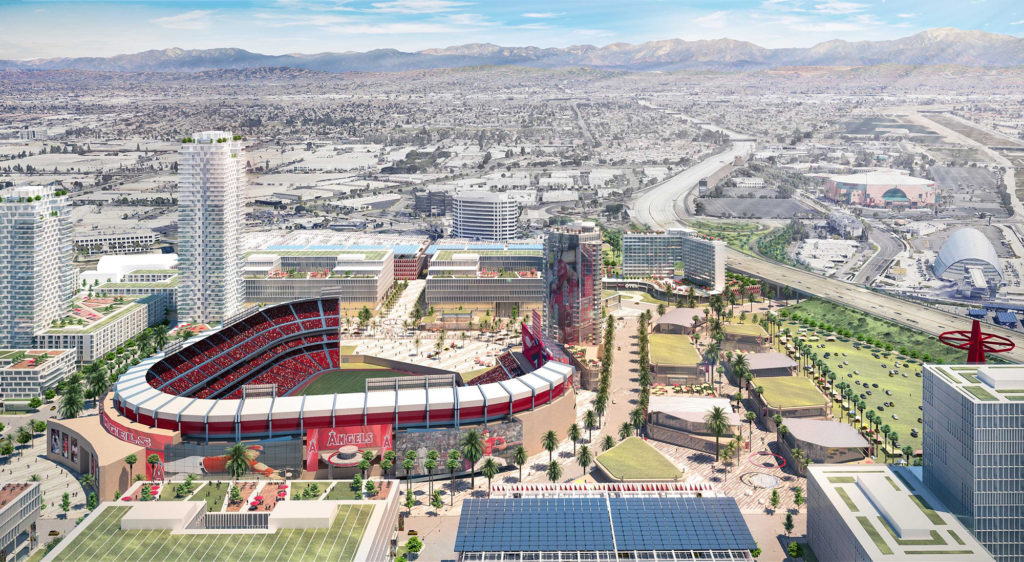
When the Los Angeles Angels pitched a mixed-use development centered on a new or renovated Angel Stadium, the project held so much promise. Now it’s being challenged on several state and local fronts.
To say that California is a challenging state for development is an understatement. It’s also a state where you won’t find much in the way of government participation in funding or financing sports facilities; that’s why the most recent large-scale venues (SoFi Stadium, Intuit Dome, Chase Center) were all privately financed.
The same model was followed in Anaheim, where Angels owner Arte Moreno struck a deal with the city to buy the 20-acre Angel Stadium site and an additional 133 acres comprising 12,500 parking spaces for games and events, and City National Grove of Anaheim, a 1,700-seat theater. The total cost: $150 million in cash and $170 million in community benefits, including affordable housing. The goal was a mixed-use development a la The Battery.
That deal came after much debate: opponents of the sale argued the land was undervalued, and affordable-housing advocates argued the deal did not go far enough to address a very real problem of a lack of affordable housing in Anaheim. And, as one would expect, lawsuits ensued once the deal between the city and Angels was approved. There is one big issue looming and one small issue in the news.
The big issue, and one that could derail the entire project, is whether the sale met state rules for the sale of surplus property. This is a big deal for the Newsom administration. State rules say that when a city sells land, it must first be offered to a state-approved list of affordable-housing developers for bidding. Cities can shape the requirements set forth in an RFP, however. In San Diego, we’re seeing the city tripped up by the Surplus Land Act, forcing a second run at a sale of the Pechanga Arena site to developers after the first run did not meet state guidelines. Anaheim officials say they met all provisions of existing law when planning a sale; it’s under review.
The smaller issue: the People’s Homeless Task Force filed suit, saying the deal did not meet state standards for state public transparency laws. Right now the lawsuit is in discovery, and the two sides are sparring over whether the city adequately responded with all public records relating to consideration of the sale. Now, we’re getting deep in the legal weeds when we start discussing whether search terms were adequately responsive, and determining what search terms are adequate is an art, not a science. After city production, Orange County Superior Court Judge David Hoffer ordered more discovery, per the Los Angeles Times:
Hoffer ruled Monday that the city’s affirmations that it had searched for all relevant documents were insufficient because “they do not provide any information about how the search itself was performed or even … how the searchers were instructed to perform it.” Hoffer ordered the parties to meet and agree on the search terms to be used in a new search….
He has made no rulings about the merits of the case, and the parties are scheduled to discuss a trial date at a hearing next month.
Disagreements about discovery are not uncommon, so it’s important not to read too much into this ruling. Just a normal part of the process called development in California.
RELATED STORIES: Anaheim moves forward on Angel Stadium sale; Angels, Anaheim agree to 30-year team commitment; Angels map out proposed development agreement; Angels ballpark plan expected to be unveiled this month; Moreno: No Decision Yet on Replacing or Renovating Angel Stadium; Group Threatening Lawsuit Over Angel Stadium Sale; Anaheim Approves Angel Stadium Sale; Angels Look to Tap Into Ballpark Development Plan; Details Emerge on Proposed Angel Stadium Land Sale; Proposal Calls for Angels to Remain in Anaheim Through 2050
